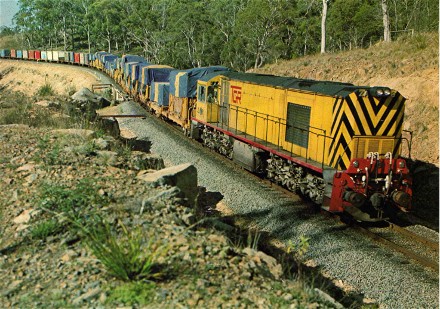Beginning in the 1930s, the Railway Institute in Tasmania was responsible for organising and providing facilities for recreational, social and education events and programs for Tasmanian Government Railway (TGR) employees and their families.

The Railway Institute was staffed with railway personnel and most facilities were provided by TGR. The Institute personnel were also responsible for running the Railway Station Accounts courses and providing accreditation for those qualifying. Social and recreation halls were provided at Launceston, Hobart, Conara, Devonport and Wynyard. These halls also contained offices, library, snooker room, kitchen and some other sporting and social facilities. The Launceston hall contained a Commonwealth recognised, indoor small-bore rifle range and was also used as a boxing stadium.
The Institute has always organised sporting events for its members. Having branches in Launceston, Hobart, Conara, Devonport and Wynyard leant itself to intrastate sporting events between the branches with Launceston often having more than one team because of its size.
After Australian National Railways Commission (ANRC) took over the Tasmanian Government Railways in the 70s and Railway employee numbers began to fall, Railway Institute facilities were sold. The last two to be disposed-of were Devonport and Wynyard. Devonport was sold by ANRC just before the whole railway was sold to “ATN Tasrail” which was a small subsidiary of “Wisconsin Central” a large railway in the USA. That was just before the Tasmanian railway was sold to the private “ATN Tasrail” or “Tasrail Pty Ltd”.
As well as providing hall facilities, the Railway Institute in Tasmania purchased a two-bedroom house at Scamander and a three-bedroom, ex-station master’s house at Claremont. Also a 6-bedroom facility at Stanley and a 6-bedroom facility in Devonport were provided by TGR. These were used for Tasmanian Railways Institute members and their families for affordable holidays. Later, a house at Wynyard and another at South Burnie joined them. After passenger trains were discontinued in 1978 and employee numbers began to decrease, the homes at South Burnie, Wynyard and Stanley were abandoned. The Devonport holiday home still remained in use, however the Claremont house was sold and an almost new 2-bedroom unit was purchased in Claremont. Also the small house at Scamander “Weona” was sold and two units were purchased at 109 St Helens Point Road. With the demand high in Hobart another unit was purchased at Main Road, Claremont, Hobart. Also when a 3-bedroom house in Launceston, used for offices by AN Railways, was abandoned, it was furnished by the Institute for another holiday home.
During the time that ANRC owned the major railway in Tasmania, one Chairman, Mr. Lou Marks had the “Master Operating Lease” drawn up to protect future administrations taking the above facilities from the Institute. However, with government legal threats, the Institute was made to purchase the previous railway’s equity in the holiday homes and become completely separate from the railway administration. The Tasmanian membership paid $100,000 and the mainland administration borrowed some more to buy the railway’s equity in St Helens, Launceston, Devonport and the two in Hobart. In 1997 the Institute in Tasmania became almost autonomous and became administered by volunteers. The Institute in Tasmania was assisted in administration by the board of AN Institute Inc., the Executive Officer and staff in Port Augusta.
Due to the very large reduction of railway employee numbers, Institute now accept members who are not and never were railway workers. Also, at an Institute Officers Conference, all Railway Institutes in Australia and New Zealand agreed to reciprocal rights in the use of each other’s Holiday Homes.
After 2010, the South Australian membership struck financial difficulties with paying salaried staff and membership numbers plummeting. It has been agreed that Tasmania should disaffiliate, become autonomous with a new name, and be “Incorporated”. This would have happened earlier except that the 30 to 40 thousand dollars to transfer the holiday homes from ANI Incorporated to TRI Incorporated was beyond Tasmania’s financial ability. The high rated and high Land taxed Devonport holiday home was sold, a cheaper 2 bedroom unit was purchased to replace it and with the State Government permitting a transfer fee reduction, which allowed the new Tasmanian Railways Institute Incorporated to disaffiliate from ANI on the 20th of April 2016 with a good financial future.